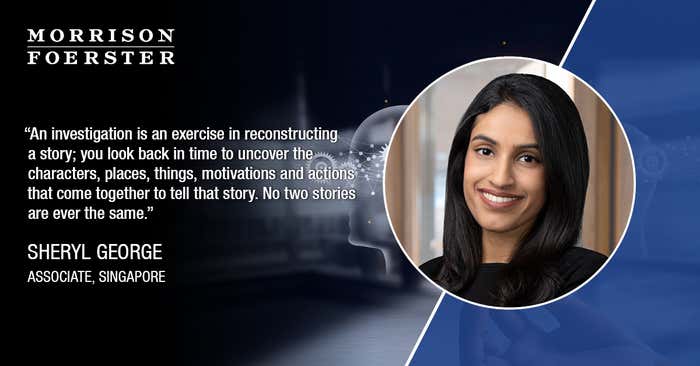
Sheryl George is a disputes and compliance associate in MoFo’s Singapore office. Her practice focuses on investigations and white-collar matters, regulatory and global compliance, including compliance due diligence for corporate transactions, as well as complex commercial disputes. Sheryl has experience working on a broad range of complex matters, with particular expertise in fraud and corruption, money laundering, economic sanctions, as well as cybercrime and cybersecurity. Sheryl works with clients across a range of sectors including technology, e-commerce and private equity.
Before joining MoFo, Sheryl was a Deputy Public Prosecutor/ State Counsel in the Criminal Justice Division, Financial and Technology Crime Division, and the Advocacy Group of the Singapore Attorney-General’s Chambers. Serving as lead prosecutor and state counsel, she spearheaded a wide variety of financial crime and regulatory matters, and successfully argued a number of cases before the High Court of the Republic of Singapore.
Sheryl has an active interest in pro-bono work and she recently partnered with the International Legal Foundation in a groundbreaking initiative to train public defenders in Afghanistan to handle anti-corruption cases. Sheryl also regularly writes on investigations and white collar issues for leading publications and was a co-author of the chapter on Data Privacy and Transfers in Investigations in GIR’s 2020 Asia-Pacific Investigations Review. She has also written on transactional compliance due diligence for the Ethisphere Institute’s Business Ethics Leadership Alliance (BELA) Asia Pacific Magazine.
What was it that initially drew you to this area of law?
I began my career as a prosecutor in Singapore, with much of my time spent investigating and prosecuting a wide variety of financial crime and regulatory matters. Much of what drew me to my work also continues to hold true in my practice at MoFo today: an investigation is an exercise in reconstructing a story; you look back in time to uncover the characters, places, things, motivations and actions that come together to tell that story. No two stories are ever the same; they each raise different (and often unexpected) issues and I am drawn to the unique problem solving challenges each presents. An investigations lawyer would be hard pressed to say that any day on the job was “routine.”
Besides that, I was also drawn to the diversity of people that an investigations lawyer has the opportunity to interact with—in-house counsel, the client’s employees and various stakeholders, forensic investigators and other professional service providers, regulators and law enforcement agencies. As someone who enjoys working closely with people, investigations are exciting—conducting witness interviews and working closely with clients, colleagues, and experts to develop the right solutions makes for enjoyable and rewarding work.
Do you have any examples of interesting work you’ve performed in this space?
I spend a significant amount of my time working very closely with one of the firm’s largest global clients. I work on a wide variety of cases with this client, but my work is made most interesting because our close working relationship has afforded me the unique opportunity to really get to know the company and to build a deep understanding of its ins and outs—how they operate internally, what drives their decision-making, and its risk tolerance levels. Understanding the why behind client decision-making is one of the most thought-provoking parts of my job.
This insider view has also given me the perspective from which I am able to ask detailed and informed questions about the company’s needs and priorities. This has in turn translated into a more acute understanding of what clients expect from best in class service—solutions that are far from cookie cutter, but which are instead, tailored to their unique circumstances, and anchored in a strong grasp of their particular risk profiles.
Can you speak to the importance of mentorship in your career, or perhaps why you are driven to mentor others?
Mentorship is absolutely key. I strongly believe that every lawyer’s development is in part dependent on the mentorship they receive, but so often good mentorship is hard to come by. I am thankful that I have had and continue to have great mentors who invest in me, and who champion my career. Over the years, my mentors have had immense faith in me, often seeing in me abilities of which I was not aware and giving me the opportunities to push myself and develop my skillsets as an attorney—whether by allowing me to lead a difficult trial, or to present to a client in challenging circumstances. Having this privilege leaves me with a sense of responsibility to more junior or soon-to-be attorneys—to encourage and to help where I can. I believe it also helps to remember that the standards of excellence in our firms and our profession as a whole benefit when we focus on the betterment of those who join us.
Learn more about MoFo’s commitment to the recruitment, retention, and advancement of diverse attorneys here.